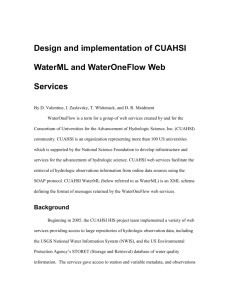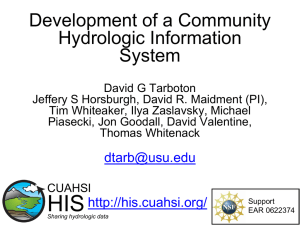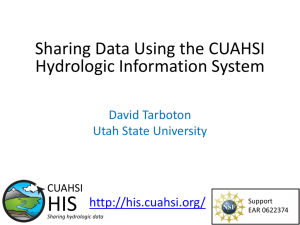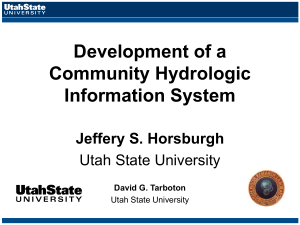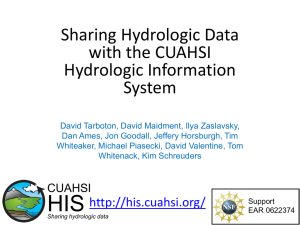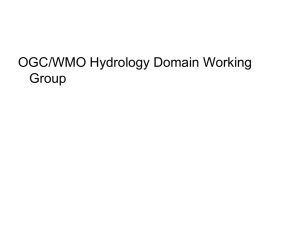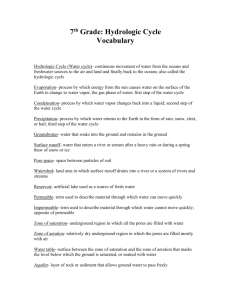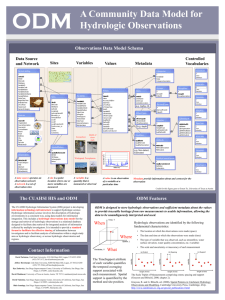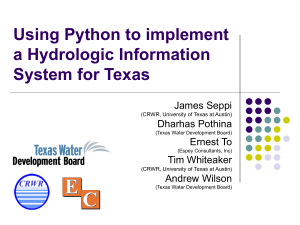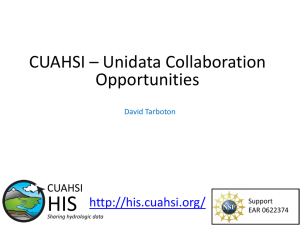DID_presentation_July24_iz - San Diego Supercomputer Center
advertisement
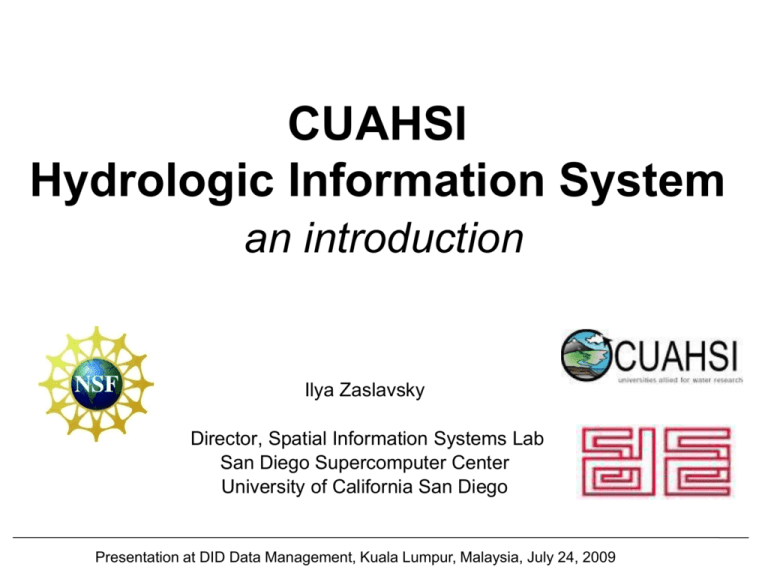
CUAHSI
Hydrologic Information System
an introduction
Ilya Zaslavsky
Director, Spatial Information Systems Lab
San Diego Supercomputer Center
University of California San Diego
Presentation at DID Data Management, Kuala Lumpur, Malaysia, July 24, 2009
San Diego Supercomputer Center
• Founded in 1985, as one of the five
original supercomputer centers,
funded by the National Science
Foundation
• 400 employees
• Advanced research in highperformance computing and
networking
• R&D and cyberinfrastructure
projects: in neuroscience, geology,
astronomy, environmental sciences,
molecular biology, hydrology
SDSC building on UCSD
campus
Consortium of Universities for the
Advancement of Hydrologic Science, Inc.
120+ US
Universities
An organization representing more than one hundred
United States universities, receives support from the
National Science Foundation to develop infrastructure
and services for the advancement of hydrologic
science and education in the U.S.
http://www.cuahsi.org/
What is CUAHSI HIS?
CUAHSI HIS: NSF support
through 2012 (GEO)
Partners:
Academic: 11 NSF hydrologic
observatories, CEO:P projects,
LTER…
Government: USGS, EPA,
NCDC, NWS, state and local
Commercial: Microsoft, ESRI,
Kisters
International: Australia, UK
Standardization: OGC, WMO
(Hydrology Domain WG, CHy);
adopted by USGS, NCDC
An online distributed system to support the sharing of hydrologic data from
multiple repositories and databases via standard water data service protocols;
software for data publication, discovery, access and integration.
Observation Stations Map for the US
Ameriflux Towers (NASA & DOE)
NOAA Automated Surface
Observing System
USGS National Water Information System
NOAA Climate Reference Network
Build a common window on water data using web services
Water Data
Water quantity
and quality
Soil water
Meteorology
Remote sensing
Rainfall & Snow
Modeling
Sources of Observations Data
Point Water Observations Time
Series
A point location in space
A series of values in time
Getting Water Data (the old way)
Different Query Pages
Different Query Responses
Web Pages and Web Services
http://www.safl.umn.edu/
http://his.safl.umn.edu/SAFLMC/cuahsi_1_0.asmx
Uses Hypertext Markup Language (HTML)
Uses WaterML
(a Markup Language for water data)
HTML as a Web Language
HyperText
Markup Language
<title>Texas Water Development Board</title>
<!DOCTYPE HTML PUBLIC "-//W3C//DTD HTML 4.01 Transitional//EN">
<html>
<head>
<meta name = "Robots" content = "index,follow">
<meta name = "Priority" content = "home,twdb,homepage">
<meta name = "Author" content = "Texas Water Development Board, Agency
Number 580">
<meta name = "Title" content = "Texas Water Development Board">
<meta name = "Description" content = "Texas Water Development Board
Home Page">
<meta name = "Keywords" content =
"water,drought,rain,conservation,groundwater,surfacewater,lake,reservoir,hydr
ology,geology,desalination,TWDB,loans,grants,wastewater,sewage,Clean
Water,Drinking Water,State Revolving Fund,planning,State Water
Plan,GIS,Geographic Information Systems,Mapping,data">
Text and Pictures
in Web Browser
WaterML as a Web Language
Streamflow data in WaterML language
Discharge of the San
Marcos River at Luling,
June 28 - July 18, 2002
Point Observations Information Model
Utah State
Univ
Data Source
Little Bear River
WaterOneFlow
Service
Network
GetSites
Little Bear River at Mendon Rd
Sites
Dissolved Oxygen
GetSiteInfo
GetVariableInfo
Variables
9.78 mg/L, 1 October 2007, 5PM
Values
GetValues
{Value, Time, Metadata}
• A data source operates an observation network
• A network is a set of observation sites
• A site is a point location where one or more variables are measured
• A variable is a property describing the flow or quality of water
• A value is an observation of a variable at a particular time
• Metadata provide additional information about the value
WaterML and WaterOneFlow
Site Codes
Variable Codes
Date Ranges
GetSites
GetSiteInfo
GetVariableInfo
GetValues
Data
DEC
Data
UVM
Data
USGS
WaterML
Client
LOAD
WaterOneFlow
Web Service
TRANSFORM
Data
Repositories
EXTRACT
WaterML is an XML language for communicating water data
WaterOneFlow is a set of web services based on WaterML
Standard Water Data Services
• Set of query functions
• Returns data in WaterML
Next Step: OGC-WMO Hydrology Domain Working Group:
WaterML 2.0
https://lists.opengeospatial.org/mailman/listinfo/hydro.dwg
http://external.opengis.org/twiki_public/bin/view/HydrologyDWG/WebHome
Contact: Ilya Zaslavsky, co-chair
NWIS Daily Values (discharge), NWIS Ground Water,
NWIS Unit Values (real time), NWIS Instantaneous
Irregular Data, EPA STORET, NCDC ASOS, DAYMET,
MODIS, NAM12K, USGS SNOTEL, ODM (multiple sites)
Hydrologic Information System Service Oriented Architecture
Deployment to test beds
Customizable
web interface
(DASH)
Global search (Hydroseek)
Other popular online
clients
HTML - XML
ETL services
Ontology tagging
(Hydrotagger)
Controlled
vocabularies
WSDL and ODM
registration
Water Data Web
Services, WaterML
Ontology
Test bed HIS
Servers
Desktop clients
WSDL - SOAP
HIS Central
Registry & Harvester
Metadata
catalogs
Data publishing
ArcGIS
Matlab
IDL, R
Excel
ODM DataLoader
ODMTools
Server config
tools
HIS Lite
Servers
Central HIS
servers
External data
providers
Programming
(C#, VB..)
MapWindow
Modeling
(OpenMI)
HIS
Desktop
Streaming Data
Loading
Central
HIS
Data
Services
Catalog
Semantic Tagging of Harvested Variables
Hydroseek
http://www.hydroseek.net
Supports search by location and type of data across multiple
observation networks including NWIS, Storet, and academic data
Against the NIH Syndrome
2006:
► CUAHSI HIS web services are discussed on the BASINS mailing list as a new way
to access hydrologic data. The list is mostly used by hydrologists and developers
outside academia;
► NCDC develops ASOS web services following WaterML
2007:
► MOU with USGS; USGS is developing WaterML-compliant GetValues service;
► GLEON uses an early version of ODM to develop their own schema (VEGA);
► Phoenix LTER is developing ODM (in MySQL) and WaterML services (in Java);
► A Google Earth-based client for CUAHSI web services is developed at CSIRO,
Australia;
► Deployment to 11 hydrologic observatory test beds, + CBEO (CEOP project)
2008-2009:
► KISTERS develops WaterML-compliant web services over their database;
► Workshops at state agencies
► MapWindow open source GIS develops WaterOneFlow parsers;
► Florida, Texas and Idaho use ODM and WaterOneFlow web services to provide
access to state data repositories; New Jersey is considering the same;
► Another CEOP project, at UC-Davis, is implementing ODM (in Postgres) and web
services (in Java);
► Stroud Water Research Center; WRON; CZO; … many that we don’t know…
► Now SBRP: data from UCSD, UA, more?
► Integration with streaming data middleware (Open Source Data Turbine)
The International Workshop on
Hydrologic Data Management and
Modeling in South East Asia
July 20-24
University of Malaya
Learning how the system works
Publishing hydrologic data
Setting up a server for SEA
Already published: sample data from JPS
(Malaysia) and from Indonesia
Data published as web service:
http://svctag-2z3322s/jps/cuahsi_1_0.asmx
These are results of GetValues
for JPS:3116434, Streamflow data
In HydroExcel
Charts of the same data
In HydroExcel
Area of interest
In HydroSeek
Finding JPS stations
In HydroSeek
More information about JPS stations
In HydroSeek, and data download
JPS data downloaded
from HydroSeek
Zooming in on Indonesia
Looking for COD measurements
In HydroSeek
Zooming in to stations
Summary
• CUAHSI HIS = Cyberinfrastructure for managing and
publishing observational data
– Supports many types of point observational data
– Overcomes syntactic and semantic heterogeneity using a standard data
model and controlled vocabularies
– Supports a national network of observatory test beds
– Maintains national registry of services (1.75 million stations – the
largest in the world)
• WaterML is a standard language for consistently
communicating water observations data from academic and
government sources using web services; already adopted by
several federal agencies. Joint WMO and OGC activity to
enhance it.
• The system is already deployed at multiple locations
• It is free and open source

